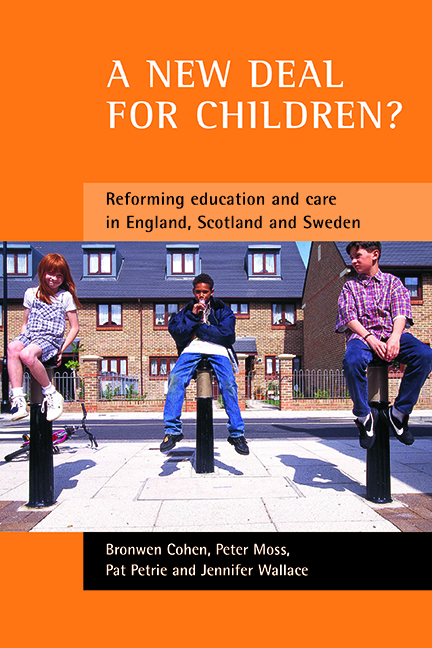Book contents
- Frontmatter
- Contents
- Acknowledgements
- List of abbreviations
- Glossary of terms
- Part One International comparisons of social and educational reforms: background and contexts
- Part Two Bringing childcare services into education
- Part Three A comparative overview and future directions
- References
- Appendix Fieldwork
- Index
- Also available from The Policy Press
five - Sweden
Published online by Cambridge University Press: 20 January 2022
- Frontmatter
- Contents
- Acknowledgements
- List of abbreviations
- Glossary of terms
- Part One International comparisons of social and educational reforms: background and contexts
- Part Two Bringing childcare services into education
- Part Three A comparative overview and future directions
- References
- Appendix Fieldwork
- Index
- Also available from The Policy Press
Summary
Farrah’s story
Farrah and her family moved to Sweden from Iran in 1998 when she was only two years old. As asylum seekers they arrived with very little money or personal belongings. They now live in a city in the west of Sweden and, although the majority population is Swedish, a fifth of the population in the city were born outside Sweden.
Farrah’s father, Adel, works as a mechanic, earning around SEK180,000 (€19,509) per annum, below the national average of SEK191,000 (€20,701) per annum. Around 30% of this salary goes on taxes, but the family receives child benefit at SEK950 (€103) per child per month. Farrah’s mother, Zari, like most mothers in Sweden, works part time (and often works overtime), but for relatively long hours: in Zari’s case about 30 hours a week at a local grocery shop. Farrah also lives with her younger brother Hamid, who is two years old and attends the local pre-school centre while his mother is working.
Farrah’s care and education, from birth to seven years old
Like most young children in Sweden in the late 1990s, Farrah attended the förskola (pre-school centre) until she was five years old. She started attending as soon as possible after the family arrived in Sweden back in 1998, as her parents wanted her to settle into her new culture quickly. She spent 35 hours a week in the förskola, which like most pre-school centres, was run by the local municipality (commune). Her group at the förskola had its own rooms, and with 12 children and two adults it had a relaxed and calm atmosphere. Both of the adults were pre-school teachers, trained to degree level in early years childcare and education.
Although there is a national pre-school curriculum, it refers to general principles, such as democracy and openness, and goals, rather than specifying in a detailed way topics to be covered. The goals in the curriculum are broad objectives for teachers to aim for rather than targets that children must reach. Farrah’s personal development and learning were not formally assessed, and she learned about the world around her through play and activities. Usually, the group worked with themes, like water or seasons, and constructed activities together around these topics.
- Type
- Chapter
- Information
- A New Deal for Children?Reforming Education and Care in England, Scotland and Sweden, pp. 135 - 178Publisher: Bristol University PressPrint publication year: 2004



